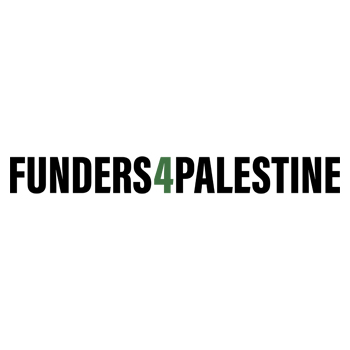As a mass movement for Palestine has been sparked and invigorated across the globe, people everywhere are making common cause with the Palestinian struggle and weaving connections with other calls for liberation. From Haiti to Sudan to Congo, Armenia to West Papua, grassroots movements are un-earthing and naming the ways in which militarism, capitalist extraction, and imperialist expansion wreak havoc on so many lives in so many places. The global call for ceasefire is evolving into a united demand for justice that is transcending borders, remaking the political landscape and sparking an urgent call for a new order.
Yet, the horrors of the last year have shaken the core of our collective humanity. And they have forced a profound reevaluation of the terms of philanthropy for many of us. Everywhere we look the institutions, frameworks, and ideologies we have built are being contrasted in real time with a live-streamed genocide against which the shallow promise of international human rights instruments and philanthropic funding are no match. This is not a new problem that began on October 7th, but rather part of the stark reality of Palestinian life over the last 80 years, and in particular since the Oslo Accords of the 1990’s and the mass NGO-isation and obliteration of the infrastructure of the liberation movement. This trend has only accelerated and expanded since October 7th.
In the United States, the Federal Government has been advancing plans to crack down on 501c(3) charitable organizations expressing solidarity with –– or moving money to –– organizing in Palestine. This has included Senate Bill 3436 which aims to strip tax exempt status from sympathetic not-for-profits, effectively rendering them inoperable; ongoing congressional hearings where even the largest social justice foundations are asked to justify public statements; witch-hunts in the right-wing press targeting public foundations; and a general atmosphere of fear, repression, and backlash at the legislative level.
The crack-down is not simply confined to the State. Many of the most powerful private funding institutions in the US and Europe have begun tacitly or explicitly monitoring their grantee partners. This includes close surveillance of social media accounts, inserting exclusions in grant-agreements that forbid the grantee from criticizing Israel or the Zionist colonial project, and the delay or deferral of grant-renewals and explicit defunding of pro-Palestine intermediaries based solely on disagreement with their public statements. Even for those who have not explicitly lost funding, the general atmosphere in US and European philanthropy over the last 11 months has been one of fear, silencing and coercion whose role it is to serve a Zionist imperialist agenda.
As June Jordan declared three decades ago, “Palestine is the moral litmus test of our time.” Palestinian liberation is essential to all of our work as justice funders. It is a potent symbol of our collective struggle for sovereignty over our lives, our lands, and our bodies. Palestine is a litmus test precisely because it exposes the truth: the West’s complicity in colonialism, ongoing exploitation, human rights abuses, ecocide, and planetary devastation, all in service of a colonial agenda manifest as white supremacy through Zionism. Palestine is not merely a geopolitical issue; it intersects with racial, disability, climate, reproductive, queer, and feminist justice issues. It connects the various aspects of our funding portfolios, yet it is often deliberately marginalized to maintain the western status quo. The task of liberating Palestine is simultaneously a task of liberating our funder portfolios, and indeed ourselves.
Twenty years ago INCITE!, a network of radical activists organizing against state violence, convened a conference to detail the relationship between the charity sector and liberation movements resulting in the book, The Revolution Will Not Be Funded: Beyond the Non-Profit Industrial Complex, after losing funding for their vocal support of Palestine. This is something all too familiar given the rampant defunding of Palestine today. If nonprofits are to resist functioning as a form of soft social control to placate the people and maintain order, or even worse, as a tool of state repression, we must embed Palestine into all our portfolios and interrogate the very real and practical ways in which we move resources, the mechanisms of accountability we embed in the work, the very places our funds and our endowments are invested.
Funders4Palestine (F4P) is a collective response to this call. Beginning with the criminalization and defunding of Palestinian organizations in 2021, and accelerating since October 2023, we exist to organize the philanthropic sector towards deeper material solidarity with the Palestinian struggle, anchored in a wider vision of collective liberation. In light of the ongoing genocide in Gaza –– itself the latest chapter in an eight-decade long settler colonial project –– Funders4Palestine has emerged as an essential and growing block in philanthropy. The “Funders for a Ceasefire Now: Philanthropy Open Letter for Justice and Humanity” published in October was signed by more than 1,200 institutional and individual signatories and is just one part of a wider funder-organizing strategy. Together, we are beginning the urgent and necessary task of building the infrastructure to move liberated resources for Palestine in partnership with Palestinian activists, civil society, and movements in the diaspora and across the world, in times of genocide and beyond. The task is critical. It is urgent. It will need us all.
Welcoming an influx of foundation staff and individual donors, F4P has emerged as a significant organizing bloc in the Palestinian solidarity landscape. In addition to rallying resources, we convene monthly political education sessions, and are responding to backlash, defunding and increasing attacks on progressive funders. We organize collectively at funder meetings to counter the ongoing erasure and exceptionalism of Palestine in the philanthropic community and, inspired by the student uprisings, are planning for philanthropy to actively divest their endowments from the arms trade inline with the global Palestinian call for Boycott, Divestment and Sanctions (BDS).
The uprisings in the United States after the murder of George Floyd led to widespread conversations around decolonising wealth, trust-based giving, and movement-led approaches to philanthropy. These conversations have dominated the sector over the last four years, with a surge in systemic analysis and the announcement of new funder strategies. However, this reckoning fell short and philanthropy has ultimately failed to truly grapple with underlying questions of power –– and ultimately the term of liberation. Until we sufficiently tackle this dilemma, philanthropy will continue to operate as an organ of repression –– at the level of the state, and the imperial system writ large. We have as a sector reduced the political to the technical, leading with the performance of accountability whilst displacing the politics of liberation to another conversation, for another day. The scene has long been set for this current moment.
How do we move together when even the basics are now under question? What does it look like to move as human rights and social justice funders when the very notion of the universal human right has been so eroded by a live streamed genocide as to no longer have any meaning at all?
At these moments, we must look to the places where freedom has always been fought for and won. The answers are not to be found in the institutional frameworks around which our sector is built, but in the political theories and practices of the liberation struggles that have always been the only way that people get free. And yet it is striking to many of us how little the terms of liberation are discussed in our institutions, even while we lift up social movements as the solution. Indeed, the ways in which we have sanitized and depoliticised the terms of movement organizing –– while displacing the complex, messy, and contentious realities of freedom struggles –– is a core philosophical challenge that has, since October 7th, become a very practical one.
So how do we move from here?
As millions across the world continue to apply pressure towards a permanent end to the genocide, progressive philanthropy finds itself at a cross-roads. Our shared calls for a ceasefire must become the floor, not the ceiling, of our collective organizing. How do we build together from the demand for an end to genocide towards a collective call for the safety, dignity, and freedom of the Palestinian people? How, in short, do we organize ourselves as funders beyond the narrow terms of ceasefire towards the expansive promise of liberation? If we are to be truly effective in ushering in a groundswell of global justice, one that is woven into the fabric of our missions, we must both unpack and resist our (nonprofits and charities) complicity in human suffering under the guise of “neutrality.”
Once again philanthropy finds itself at a crossroads. Do we side with those who continue to hoard power to extract profit off of human lives, or do we choose the path of the people and all those rising up to demand an end to this horror? Do we choose to usher in a world of safety, dignity, and justice for all?
Note: This is a first in an ongoing series of reflections and calls to action. To find out more email contact@funders4palestine.org or visit www.funders4palestine.org
Join us in building a future rooted in justice and liberation.

